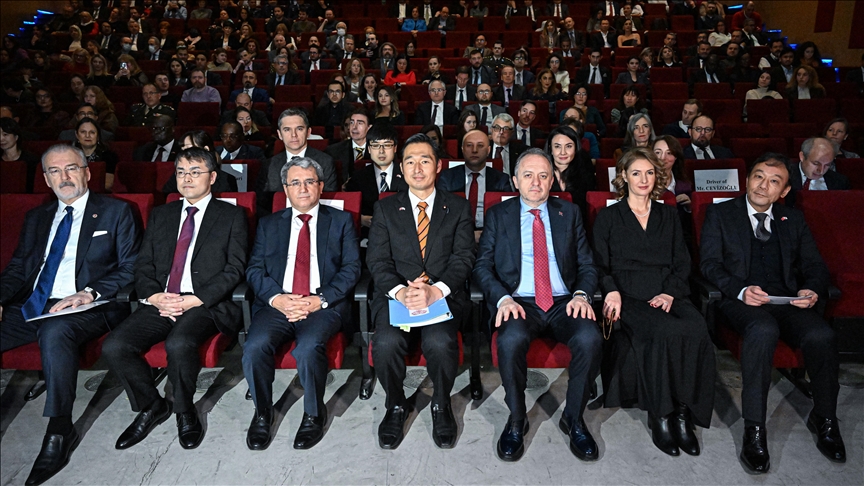ANKARA
Japan and Türkiye celebrated the 100th anniversary of the establishment of diplomatic relations with the screening of a film in the Turkish capital.
Japan’s ambassador to Türkiye, Katsumata Takahiko, made the opening speech on relations between the two countries, saying that both countries, facing natural disasters like earthquakes, share a long history of friendship.
“Last year, a significant earthquake hit the southeast of Türkiye on Feb. 6, causing loss and leaving deep scars in many hearts. A year has passed since this disaster. Additionally, on the first day of the new year, a major earthquake occurred in Japan’s Noto Peninsula, and many residents are still facing challenging times. We received warm condolences, especially from President Recep Tayyip Erdogan, and we want to express our gratitude,” he said.
The ambassador then presented the anime movie “The House of the Lost on the Cape” as a launch of centennial celebrations and opening of the Japanese Film Festival.
Yoichi Fukazawa, a member of the Japanese House of Representatives, speaking at the event highlighted that rarely diplomatic relationships deepen and last for more than a century, especially when considering the geographical distance of over 8,000 kilometers (4,970 miles) between Japan and Türkiye.
“However, for us, this is not a coincidence. We have built friendly relations by respecting and appreciating each other’s culture and history, showing mutual regard, and assisting each other in difficult times, as our ancestors did.
“Remarkably, geographical barriers are no longer an issue. With 10 direct flights per week between Haneda/Narita airports in Japan and Istanbul and the resumption of flights to Osaka last month, the distance has become more manageable. Last year, over 70,000 tourists from Japan visited Türkiye, and more than 20,000 tourists from Türkiye visited Japan. The number of Japanese companies operating in Türkiye is rapidly increasing, bringing our countries even closer not only in diplomatic relations but also in human interactions,” he added.
Shinya Kawatsura, the director of the movie, said the story was about Yui, a high school student running away from her family, Hiyori, who lost her family in an accident, and Kiwa, an elderly woman with no relatives, meeting in a small coastal town after an earthquake and starting a new life in a mysterious house on a cape.
“The images of the tsunami striking the Tohoku region and the devastated settlements during the Great East Japan Earthquake in 2011 left deep scars in the minds of the Japanese people. Therefore, as a filmmaker, I chose not to directly depict the earthquake or tsunami but rather focus on portraying the town in ruins. Before starting to work on this film, I conducted extensive research on earthquake disasters, leading to this decision,” he said.
“Lastly, I would like to express my deepest condolences for the lives lost in the recent earthquake in Türkiye. It is an incredibly tragic disaster, but I believe that with everyone’s compassionate hearts in Türkiye, they will overcome this situation.”
Mustafa Hulki Cevizoglu, chairman of the Japan-Türkiye Parliamentary Friendship Group, said diplomatic relations between the two countries go back 137 years.
“In 1887, Japanese Prince Komatsu Akihito and his wife visited Istanbul and met Sultan Abdulhamid II, exchanging a chrysanthemum and a medal. In return, Sultan Abdulhamid II sent the Ertugrul Frigate to Japan in 1890, which tragically sank on its return, resulting in 532 martyrs,” he said.
He also reminded that in 1924 after Japan ratified the Treaty of Lausanne, diplomatic relations were established, and in 1925, the first Turkish representation in Japan became operational.
“In 1931, Prince Takamatsu, the brother of the Japanese Emperor, presented a ceremonial sword to (Türkiye’s founding father Mustafa Kemal) Ataturk during his visit to Türkiye. This sword is currently exhibited in the Anitkabir Museum,” Cevizoglu added.

